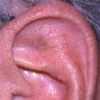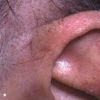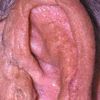- Clinical Technology
- Adult Immunization
- Hepatology
- Pediatric Immunization
- Screening
- Psychiatry
- Allergy
- Women's Health
- Cardiology
- Pediatrics
- Dermatology
- Endocrinology
- Pain Management
- Gastroenterology
- Infectious Disease
- Obesity Medicine
- Rheumatology
- Nephrology
- Neurology
- Pulmonology
All Ears: Seborrheic Keratosis and Actinic Keratosis
Benign skin lesions can arise in the outer ear as easily as in any other body part frequently exposed to the sun. Seborrheic keratosis may mimic malignant melanoma but is innocuous. Actinic keratosis is premalignant and should be excised, biopsied, and the site of excision monitored vigilantly.
Figure A Figure B


Seborrheic KeratosisFor several months, a 67-year-old man has had an asymptomatic, 0.5-cm, light tan lesion with brown specks on his left ear that is slightly raised and finely roughened (A).A 69-year-old woman presents with a raised, elongated, light tan lesion on the anterior aspect of the superior helix of about 1 month's duration (B). It is also asymptomatic.
Seborrheic keratosis is one of the most common benign skin tumors; the cause is unknown.1 These neoplasms present in numerous forms; they may be flat or, as shown here, raised with smooth or cracked surfaces. Raised lesions are superficial and can be easily treated by electrodesiccation and curettage, with or without shave removal. Some seborrheic keratoses may mimic malignant melanoma. If there is any doubt about the diagnosis, a biopsy is mandatory.
The lesion in photo A-although unique in that it occurred on the cymba concha of the external ear-was diagnosed based on its clinical appearance. The lesion was lightly desiccated and treated with curettage under local anesthesia and topical antibiotic ointment. The ear healed without complication.
The lesion in photo B was removed via elliptical excision under local anesthesia. Histopathologic examination of the excised lesion revealed mild chronic inflammation and mild solar elastosis, which confirmed the diagnosis. The ear healed with excellent cosmetic results.

Actinic KeratosisAn 84-year-old man presents for evaluation of a raised, pink lesion with a tiny scab on the anterior ridge of the left lower helix. This asymptomatic, 0.5-cm lesion has been present for 2 months.
The lesion was removed by elliptical excision. Histopathologic examination of an excised specimen revealed actinic keratosis and marked solar elastosis of the dermis with minimal atypia.
Actinic keratosis is confined to the epidermis. It typically occurs on sun-exposed areas; the incidence increases with age. An untreated lesion may involve deeper skin layers and develop into full-fledged squamous cell carcinoma. To assuage fears about cancer, stress to patients that actinic keratosis is premalignant, but advise them to monitor their skin for possible recurrence.
Biopsy-incisional or excisional, depending on the size of the lesion-is necessary for diagnosis.
Treatment modalities include surgical removal, cryotherapy, and topical 5-fluorouracil and imiquimod creams or diclofenac gel. This patient's ear healed without complication.
See also:
All Ears: Chondrodermatitis Nodularis Helicis and Verruca Vulgaris
All Ears: Auricular Seroma Pyogenic Granulomas
References:
REFERENCE:
1.
Elgart ML. Cell phone chondrodermatitis.
Arch Dermatol.
2000;136:1568.
